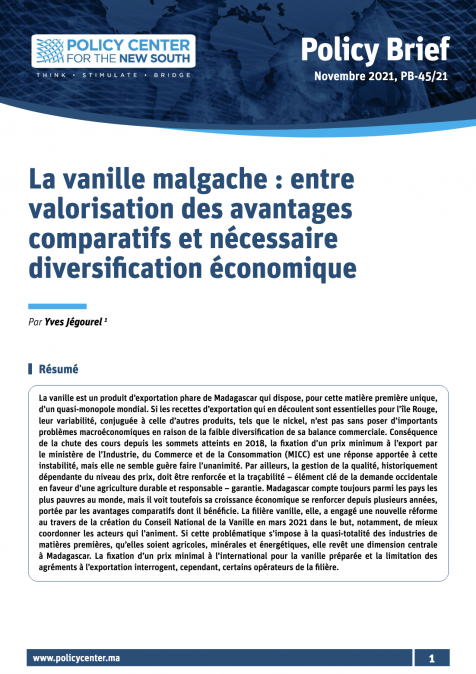Les Mardis du PCNS 12/01/2021: حلقة خاصة: تقديم التقرير السنوي للاقتصاد الإفريقي
التقرير السنوي للاقتصاد الإفريقي مشبع بروح وفلسفة مركز السياسات من أجل الجنوب الجديد. جنوب منفتح على العالم وغير مقيد في علاقته بالآخرين وفي رؤيته للذات. هذا والتقرير يدرس إفريقيا بنقاط قوتها ومعيقاتها، بمميزاتها وعيوبها، ما يجب تصحيحه وإعادة تنظيمه، وما يجب صيانته وتقويته وتوطيده. خلال الأزمة الصحية، تسبب فيروس كوفيد 19 في زعزعة التوقعات، وقلب السياسات الاقتصادية، وأثار التساؤل عن الخطط والبرامج التي سبق وتم تطويرها في هيئات صنع القرار في الدول الأفريقية والمنظمات القارية ومآلها اليوم مع الجائحة. تدور الأسئلة التي تم تناولها حول القضايا الاقتصادية، والموضوعات المتعلقة بالاندماج القاري والحكامة، وكذلك أسئلة حول المنظمات الإفريقية وصمود الدول في ظل هذه الجائحة، إضافة إلى قضايا النمو الاقتصادي، سوق الشغل، الهجرة، والأمن الغذائي، إلخ. يتطرق التقرير بين طياته إلى مجموعة من التحديات والمقاربات التي تنبني على أساسها الديناميكيات المتغيرة للقارة إن على التحديات الاقتصادية والإنمائية وتحدي التنسيق بين الاستجابات الدولية والوطنية، أو ما وراء المؤسسات من ضرورة وجود نموذج جديد يتسم بمقاربات تنبثق من أسس الحكامة وآلياتها بشكل يتماشى مع خصوصيات القارة الإفريقية. 45 دقيقة تقديم التقرير السنوي للاقتصاد الإفريقي المسيرة: إيمان لهريش، مسؤولة عن البرامج بمركز السياسات من أجل الجنوب الجديد المتدخلون: العربي الجعيدي، باحث بارز بمركز السياسات من أجل الجنوب الجديد فاطمة الزهراء منكوب، باحثة في المجال الزراعي بمركز السياسات من أجل الجنوب الجديد سلمى الداودي، باحثة في العلاقات الدولية بمركز السياسات من أجل الجنوب الجديد










